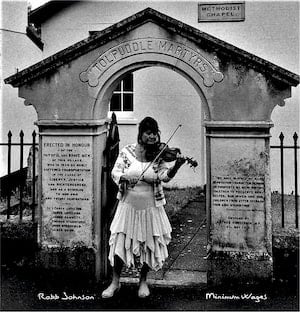
Robb Johnson – Minimum Wages
Irregular Records – Out Now
If anyone should write a real history of the country, then perhaps Robb Johnson is the person to do it. His ability to focus on the detail and allow that to tell the larger and more critical story makes his songs stand out. His latest album, Minimum Wages, adds more chapters to his contemporary history of the UK, following recent releases such as Pandemic Songs and Eurotopia.
The gentle guitar opening to Fiddler in the Rain leads to a sketch, lightly drawn, of the parade at the Tolpuddle Martyrs March in July 2020, a parade limited by COVID restrictions but beamed around the world by the now ubiquitous Zoom. A child holds a rainbow, a hand holds an umbrella, and behind, a small band of key workers march down the street to the graves of the martyrs, the rain and Jude Abbot’s flugelhorn adding to the poignancy, and all following Lorraine Tillbrook in celebration and commemoration.
That first track sets the scene for what comes next, and to no surprise to regular listeners to Robb’s songs, he scorns the current political situation in The Last Night of the Proms, voicing the shout of some in “Who will buy my hospital and privatise my virtues – just don’t touch my heritage”, a reference to the importance among some of retaining statues that simply should be moved or removed, over the importance of properly funding our necessary infrastructure.
The theme continues in Hartlepool ASDA Saturday Morning. Here is a scene of urban degeneration, poor support and people struggling to make their own way in life. Town centres are full of closed and shuttered shops, fast food outlets and queues for the food bank. And, of course, the rain. As songs, the words are more important, yet the tunes that carry them provide the vehicle to drive the message home.
A gentler tone comes with Great Aunt Gladys, though still war, political stability (and instability) and the great beacons of development, notably the NHS, all feature. The opening of bird song, a memory of the Hampshire home of Gladys, is a good foil for the opening lines about the list of casualties and the First World War. Other key moments appear in the chronology, but the main thing about Great Aunt Gladys was that she was “a Red!”. This is also a great example of one of Robb’s techniques, a lovely tune, but there is no hiding his political light under a bushel, even if “the Blairs are far too many, and the Corbyns far too few”.
Then a sort of interlude appears. It is interesting to see how this album is put together as, almost out of the blue, though we may have somehow always expected it, is a simple love song. In My Quiet Flame, we are in the home. There are times when whatever is going on outside – even the summer rain – you want to stay where you are, with who you are with, and enjoy, relish, that time when “I could stay like this forever holding on to you.” A love song if ever there was.
More domestic illustration with Sister Reynardine, and I can well remember the feeling of the 5-year-old on the stair who should not be there, and then back to the brutal history prompted by a photograph of a young woman, camera in hand, about to be truncheoned by a mounted policeman. This may have been June 18th 1984, but This Is Your History, and like many other events, the Battle of Orgreave has been “buried underground”. After all, history is written by the victors.
The title track, Minimum Wages, brings us back to now and a commentary on the issue of care workers in our caring society. Running from one client to the next, meeting unrealistic targets, not enough people in the job, “care is not about the service but the profit you can make.”
It is always difficult to critique a Robb Johnson album as the words, or rather the message is the most important thing. With others, the tune, the melody is the thing, but with Robb, you know that clear, incisive, and direct words are all-important. Having said that, you can’t have a music record without music (though I expect that that is an argument to be had elsewhere), and the tunes here have led some to note that this is his most ‘folk’-like album for some time, helped by Jason Pegg on accordion, and Jenny Carr on what I think must be the most unobtrusive piano. While musically, it may be acoustic, gentler, that only emphasises the tragic, the desperate and the inequality. Robb Johnson has not gone soft but crisp, clear and excellent.
Minimum Wages is out now.
Upcoming Dates
20th November 2021:
Bolton Socialist Club, Pandemic Songs1
19th December 2021:
The Prince Albert, Brighton – with The Irregulars
28th & 29th January 2022
Ordinary Giants, Chats Palace, Hackney
More info here – https://www.robbjohnson.co.uk/
